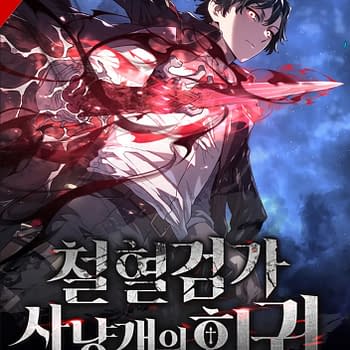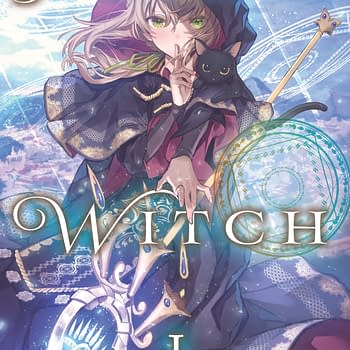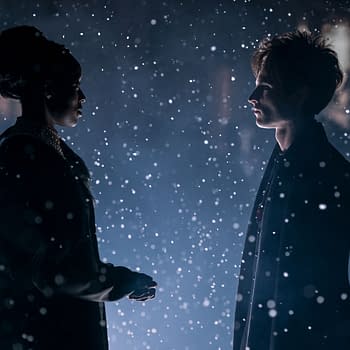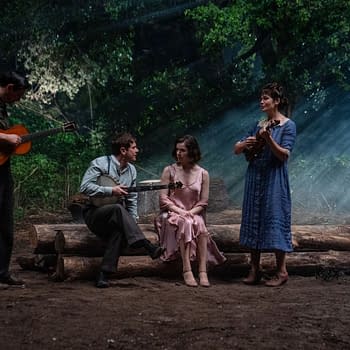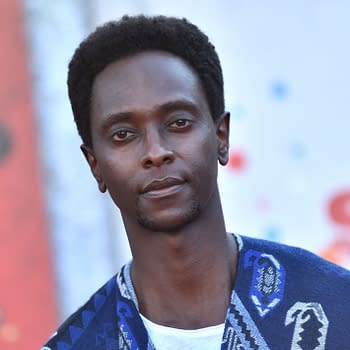Posted in: Marvel Studios, Movies | Tagged: Awkwafina, Marvel Studios, shang chi, Simu Liu
Thoughts on Shang-Chi from a Viewer Who Knows Chinese Culture
Shang-Chi and the Legend of the Ten Rings is fun. It deserves all the raves and box office it gets. You should see it, but only if it's safe since no movie is worth catching a deadly virus for. This is not a review; we already have one here and here. These are some thoughts from a viewer who knows Chinese culture as they watched it.
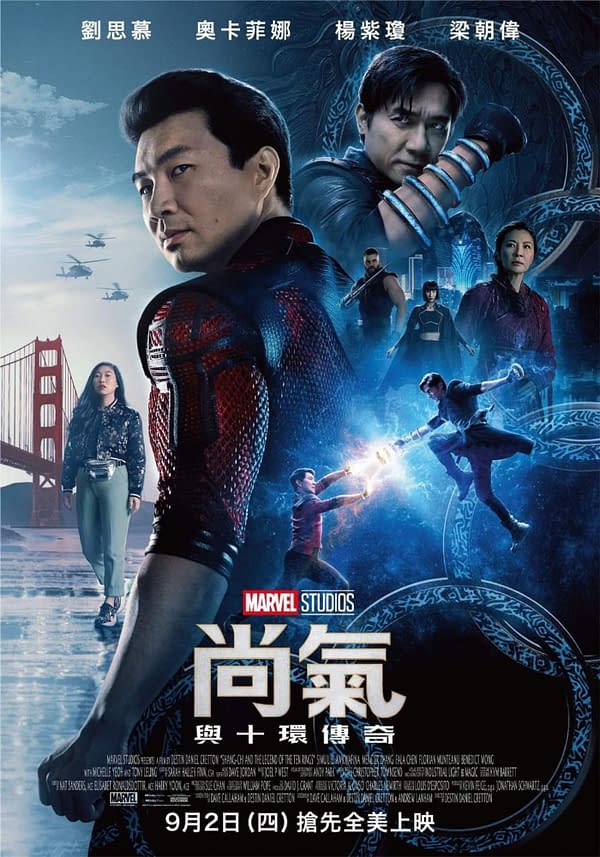
Warning: heavy spoilers. You should definitely see the movie first before you read what's below.
Bamboo forest scenes are referenced from Zhang Yimou's HOUSE OF FLYING DAGGERS. Kung fu duels where the fighters fall in love – as indicated when they cut to the fighters staring into each other's eyes in swooning slow motion – is a trope established by directors like Tsui Hark in 80s and 90s martial arts movies and continues today in Chinese movies and TV shows. Directors like Wong Kar-Wai did that with Tony Leung Chiu-Wai and Zhang Ziyi in The Grandmaster.
Xu Wenwu's (Tony Leung Chiu-Wai) fight style seems to be adapted from Chinese boxing, which is a martial art, all brutal strength, and punches. Shang-Chi's mother (Fala Chen) and aunt (Michelle Yeoh) fight using a form of Tai Chi. You see old Chinese people practising a non-combat version of those moves in the morning in Chinatown parks.
Tony Leung spoke Mandarin with a Cantonese accent because he's not a Mandarin speaker. He probably had to use a Mandarin dialect coach.
It's a relief they cast Simu Liu. The list of actors in North America who can speak Mandarin or Cantonese natively is depressingly short.
They've chosen the Chinese word for the "chi" in Shang-Chi's name to mean "breath", "gas" or "energy". That's apt for him becoming a kung fu master.
Nice to see Tsai Chin in a cameo as Katy's (Awkwafina) grandmother. Cute joke about paper replica offerings to deceased relatives in the afterlife.
Michelle Yeoh and Ronnie Cheng both spoke Mandarin with a Malaysian accent. She's not a native Mandarin speaker either. Ronnie Cheng would have learned Mandarin back in school.
The Protector is referred to in Mandarin as "The Dragon God". Wonder why they don't call it that in English. To avoid offending American Bible-thumpers?
Plot is a decent pastiche of the 80s and 90s Hong Kong kung fu movies. Lots of Tsui Hark influences. It's really an Asian-American pastiche and homage to 70s Shaw Brothers movies and 80s Hong Kong martial arts movies. Marvel really does absorb all genres for itself.
Katy taking the car out for a joyride references Ferris Bueller's Day Out.
The bus fight and scaffolding fight are influenced by Jackie Chan movies. Brad Allen, the fight choreographer and 2nd Unit Director, trained under Jackie Chan in the 90s.
Xialing's weapon of choice is the rope-dagger. Cool.
Lots of other little details that go uncommented on: Katy lives with her parents. "Shaun" lives in a dinghy basement studio, probably off-the-books where he pays his landlords in cash because he's in hiding. Neither of them could afford an apartment in San Francisco, though it's implied that as a trained assassin, he would have money hidden away for emergencies. Hence able to afford a plane ticket to Macau. Also means he probably has a fake passport.
We wondered how Shang-Chi and his sister would speak English with American accents, but that can be explained: their English tutor must have been an American recruit to the 10 Rings. But Xialing's child actress spoke with a stronger American accent than the grown-up Meng'er Zhang, who's not American-born. That can be explained: when she ran away from home and went to Macao, she would lose the American accent in the next 10 years.
Questioning of Confucian values, especially its patriarchal sexism through daddy issues. This is actually a common theme in Jin Yong's wuxia novels, which are finally getting translated into English. Daddy issues are already a very American thing, so it suits Marvel to a 'T'.
Tony Leung Chiu-Wai's Wenwu is sort of a metacommentary or pastiche of his past roles: the romantic-but-evil WWII collaborator in LUST, CAUTION, the heartbroken husband in IN THE MOOD FOR LOVE, the stoical, unbeatable Ip Man in THE GRANDMASTER. If you haven't seen those movies, you should.
The dinner scene where Wenwu explains to Katy that their names connect them to their families and ancestors, yet he doesn't mention his family name, only his given name. Katy also only gives her given name and not her family name. That's odd since every Chinese person would give their full family and given names in conversation, especially one like this.
Shang-Chi's family name is only mentioned once in the whole movie when he introduces himself to Ta Long, his mother's village.
Awkwafina doesn't even attempt to speak any Chinese. She represents Asian-Americans who don't speak their parents' native dialects, often because they weren't taught. When she tells Wenwu what her Chinese name is, he dismisses her, because he's an asshole.
The Brits among us think Trevor Slattery (Ben Kingsley), the former fake Mandarin, was named after Tony Slattery, a beloved British comedian from the 1980s and 90s who's largely left the industry.
Asian-American themes: young slackers finding their identity and purpose in life. Son dealing with getting out of disappointed father's shadow, anxiety of returning to the motherland and facing family.
That BMW Range Rover was such a blatant piece of product placement. I'm sure Disney was paid a decent fee to offset the budget.
Hey, there are 9-tailed foxes in Ta Long village. Those did originate in Chinese mythology, though anime fans now know them from Naruto.
This is an Asian story, so of course, there's a Dai Kaiju battle in the climax. Granted, Kaiju movies are a Japanese genre, but who doesn't want to see a Dai Kaiju battle? A demon that eats souls is Buddhist Horror – souls consumed are lost forever, with no chance for reincarnation.
The demonic kaiju is a pastiche of Lovecraftian ancient horror with Asian demonic creatures, a very American combination, like hybrid recipes. Hey, General Tso's Chicken is an American invention, after all, it didn't come from China. Shang-Chi gets to ride a giant dragon. Of course, he does.
Why didn't Xialing get 5 of the 10 rings at the end instead of Shang-Chi getting all 10? That would have been much more satisfying and right. Instead, they make her power-hungry.
This is not a Chinese movie. It's an Asian-American movie. The perspective is Asian-American, which has its own nuances.
Shang-Chi and the Legend of the Ten Rings is now out in theatres only.





